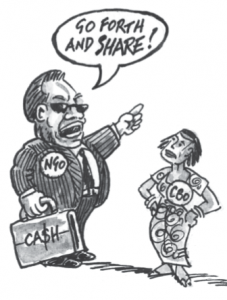Taken from: The Barefoot Collective. (2009). The Barefoot Guide to Working with Organizations and Social Change. Cape Town: Community Development Resource Association. Retrieved March 18, 2009, from www.barefootguide.org
We can easily agree that community-driven and locally-owned organisations are a good thing for development, but will any kind of organisation do? How often have we seen good organisations, from community to global levels, torn apart through conflict? Or become ineffective through poor leadership? Or become destructive to their own people because of selfish and fearful egos? Or wither away because they were unable to learn and adapt to changing circumstances?
And how often have we found that the very things development organisations are trying to change in the world exist right inside them? Many NGOs and donors advocating a more equitable sharing of power in communities are themselves organised in traditional hierarchies.
The development organisations of the future will have to be: more interdependent and participative, more humane and intuitive, less hierarchical and competitive, freer of old discriminations, more networked and nimble and able to acknowledge the diverse strengths and real needs of their members and constituencies, less tied to old dogmas and more able to learn from experience. We have started to witness organisations like this emerging and we believe that the development sector has a key role to play in experimenting and innovating their forms.
 Our task as development practitioners is not to help form or perpetuate organisations that exploit people, the natural environment, or information in ways that exclude, deplete, diminish or disempower. Rather, if development is about shifting or transforming power, there has to be a clear concept of where power can be rightfully and sustainably held. Sovereign local organisations and social movements founded on the active voices and engagement of ordinary people are a obvious place.
Our task as development practitioners is not to help form or perpetuate organisations that exploit people, the natural environment, or information in ways that exclude, deplete, diminish or disempower. Rather, if development is about shifting or transforming power, there has to be a clear concept of where power can be rightfully and sustainably held. Sovereign local organisations and social movements founded on the active voices and engagement of ordinary people are a obvious place.
A sense of sovereignty
Sovereignty is both a quality of organisation to be developed and a right to be respected and defended. The word sovereignty is well-used by small-farmer organisations and allied practitioners when they speak of food or seed sovereignty as a right to be self-reliant, of local ownership, of decision-making from a stance of consciousness and free-choice, which is not subject to the will and whims of those outside who may seek to control or exploit.
Sovereignty is a particularly powerful concept when applied to organisation, suggesting the same authentic qualities, describing a home-grown resilience, an inside-out identity, the idea of an organisation being the expression of the free will of its own constituents.
It has long been clear to us that in order for organisations or communities to change they need to have a strong sense of sovereignty in their decision-making and the way they relate to the world. This has been achieved in many small and often unnoticed ways as a result of the developmental work and support of many leaders and facilitators in civil society organisations, themselves members of communities dedicated to building healthy organisations.
Beware of latter-day missionaries
 Yet we sometimes wonder whether some NGOs and donors of the development sector have become latter-day missionaries, undermining indigenous potential and naively and unwittingly softening up the natives for more post-colonial globalisation! This is development without local sovereignty and it has long accompanied the deepening poverty of the marginalised of this world. It is also extremely difficult for the development sector to admit this veiled role without exposing its own lack of sovereignty and backbone.
Yet we sometimes wonder whether some NGOs and donors of the development sector have become latter-day missionaries, undermining indigenous potential and naively and unwittingly softening up the natives for more post-colonial globalisation! This is development without local sovereignty and it has long accompanied the deepening poverty of the marginalised of this world. It is also extremely difficult for the development sector to admit this veiled role without exposing its own lack of sovereignty and backbone.
However, the situation is far from hopeless because there are thousands upon thousands of civil society organisations that, despite enormous difficulties, are bucking this trend and have achieved high levels of sovereignty on all continents.
These many local initiatives, programmes, and groups hold great promise if larger development agencies can seek them out, learn from them, and adjust or transform themselves towards incorporating an approach that more directly builds upon, rather than co-opts or squashes, the efforts of these small, local organisations.
If this is to happen, then it requires that development practitioners, including donors, make shifts to incorporate the facilitation of the development of authentic and sovereign local organisation and social movements as a central component of their strategies, approaches, and practices.
Read Part 2


Thank you for this thought-provoking post. Trusting local knowledge and expertise is an important part of our work at Spirit in Action. Still, it is a great challenge to think about “getting our house in order” before requiring others to change. How can we ask others to “pay it forward” if we ourselves are not also helping our neighbors?
In order to shift toward more support of local, sovereign initiatives we will also need to shift the ways that donors interact with the NGOs they support. We should create platforms for equal exchange and be aware of the narrative we share with our donors.
Pingback: How Matters / Seeing the future in sovereign local organizations – Part 2
The writer sound like a real community leader with deep understanding and experience of whats happens at the grass root today. In any development that genuinely tries to foster sustainability, the power will always belong to the people.